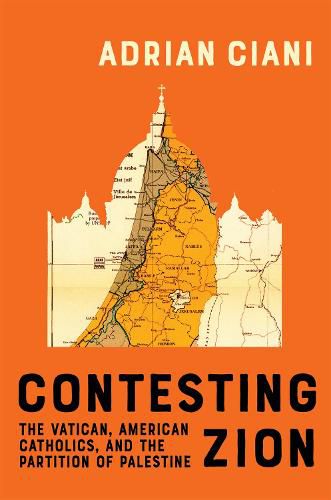Readings Newsletter
Become a Readings Member to make your shopping experience even easier.
Sign in or sign up for free!
You’re not far away from qualifying for FREE standard shipping within Australia
You’ve qualified for FREE standard shipping within Australia
The cart is loading…






The modern relationship between the Vatican and the State of Israel is rooted in a long history of hostility between Judaism and Roman Catholicism. Through the centuries, popes and theologians marginalized the Jewish people, assigning them collective guilt for the death of Jesus Christ and claiming that the sacred territory of Palestine was the true patrimony of the Roman Catholic Church. With the advent of political Zionism in the nineteenth century, Catholic fears of a Jewish-dominated Palestine were renewed.
Contesting Zion examines the relationship between the Vatican and the Zionist movement from the Balfour Declaration in 1917 to the first decade of Israeli statehood. Adrian Ciani considers the transnational nature of Catholic responses to Zionism and the creation of Israel, with a focus on the Catholic Church in the United States. From the 1920s through the 1950s, American Catholic leaders became crucial intermediaries between Washington and the Vatican. Speaking as both loyal American citizens and devout Catholics, they were uniquely positioned to articulate the Vatican's policy objectives to the American government, including on the future of Palestine. American Catholics were also instrumental in advocating the church's Palestine policy at the United Nations, playing a central role in the Holy See's attempts to shape the twentieth-century international order.
From the 1920s through the 1960s, Contesting Zion argues convincingly, American Catholics were at the forefront of the Vatican's efforts to sway the fate of Palestine and to influence the future of the wider region.
$9.00 standard shipping within Australia
FREE standard shipping within Australia for orders over $100.00
Express & International shipping calculated at checkout
The modern relationship between the Vatican and the State of Israel is rooted in a long history of hostility between Judaism and Roman Catholicism. Through the centuries, popes and theologians marginalized the Jewish people, assigning them collective guilt for the death of Jesus Christ and claiming that the sacred territory of Palestine was the true patrimony of the Roman Catholic Church. With the advent of political Zionism in the nineteenth century, Catholic fears of a Jewish-dominated Palestine were renewed.
Contesting Zion examines the relationship between the Vatican and the Zionist movement from the Balfour Declaration in 1917 to the first decade of Israeli statehood. Adrian Ciani considers the transnational nature of Catholic responses to Zionism and the creation of Israel, with a focus on the Catholic Church in the United States. From the 1920s through the 1950s, American Catholic leaders became crucial intermediaries between Washington and the Vatican. Speaking as both loyal American citizens and devout Catholics, they were uniquely positioned to articulate the Vatican's policy objectives to the American government, including on the future of Palestine. American Catholics were also instrumental in advocating the church's Palestine policy at the United Nations, playing a central role in the Holy See's attempts to shape the twentieth-century international order.
From the 1920s through the 1960s, Contesting Zion argues convincingly, American Catholics were at the forefront of the Vatican's efforts to sway the fate of Palestine and to influence the future of the wider region.